人教版高中英语选修七 Unit1 Living well-语法篇(教师版)
高中英语人教版选修7Unit1LivingwellGrammar教案(系列三)

选修七Unit1 Living wellPeriod3 Grammar定义:动词不定式是非谓语动词的一种,它没有人称和数的变化,在句子中不能独立作谓语,但它仍保持动词的特点,可以有自己的宾语和状语。
E.g. He wants his students to read the book aloud.一、不定式的意义1. 不定式的一般式:一般式表示的动作或状态发生在谓语动词表示的动作或状态的同时或之后。
当不定式的逻辑主语是这个不定式所表示的动作的承受者时,不定式一般要用被动式(to be done).eg: He seemed to be tired. The building to be finished next month is for our teachers.2. 不定式的进行式:进行式表示动作正在进行,与谓语的动作同时发生。
e.g. When I went to his home, he happened to be traveling around the world.3. 不定式的完成式:如果不定式所表示的动作或状态发生在谓语动词所表示动作或状态之前,就用完成式;若是在此基础上的被动含义,就用完成被动式( to have been done).e.g. He is said to have written a novel about the Long March.He is said to have been taught French when he was a child.4. 不定式的完成进行式:如果不定式的动作是在谓语所表示的时间之前一直在进行或有可能继续进行的动作,就要用完成进行式.eg: We’re happy to have been working with the experts all the month.二、不定式的用法:动词不定式具有名词、形容词和副词的特征。
人教版高中英语选修7Unit1Livingwell知识点总结.doc
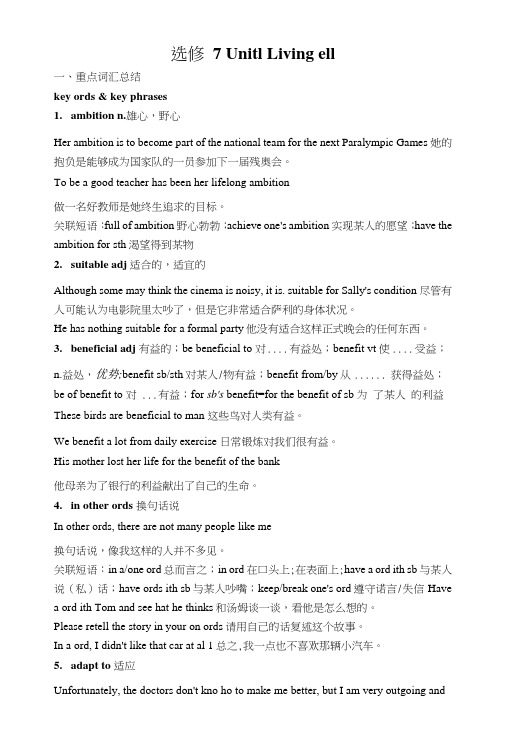
选修7 Unitl Living ell一、重点词汇总结key ords & key phrases1.ambition n.雄心,野心Her ambition is to become part of the national team for the next Paralympic Games 她的抱负是能够成为国家队的一员参加下一届残奥会。
To be a good teacher has been her lifelong ambition做一名好教师是她终生追求的目标。
关联短语:full of ambition野心勃勃;achieve one's ambition实现某人的愿望;have the ambition for sth渴望得到某物2.suitable adj适合的,适宜的Although some may think the cinema is noisy, it is. suitable for Sally's condition 尽管有人可能认为电影院里太吵了,但是它非常适合萨利的身体状况。
He has nothing suitable for a formal party他没有适合这样正式晚会的任何东西。
3.beneficial adj 有益的;be beneficial to 对.... 有益处;benefit vt 使.... 受益;n.益处,优势;benefit sb/sth对某人/物有益;benefit from/by从...... 获得益处;be of benefit to 对 ... 有益;for sb's benefit=for the benefit of sb 为了某人的利益These birds are beneficial to man 这些鸟对人类有益。
We benefit a lot from daily exercise 日常锻炼对我们很有益。
人教版高中英语选修七 Unit 1 Living well Grammar

3. 不定式在句子做表语 (1) My work is to clean the room every day. (2) His dream is to be a doctor.
Conclusion:不定式做表语常常表示主语的 “职业、职责或性质”。
2. 不定式的进行式 (1) He seems to be eating something. It’s nice to be sitting here with you. Conclusion:一般进行时表示的动作正在进行, 与谓语动词表示的动作同时发生。
3. 不定式的完成进行式 She is said to have been working on the problem for many years. 据说她研究这问题有好多年了。 Conclusion:完成进行时表示动作从过去开 始并延续至现在。
public buildings.
(subject)
3. My ambition is to work in the computer
industry when I grow up. (predicative)
4. I don’t have time to sit around feeling sorry for
Ⅴ. 不定式的被动式 1. The new drug is to be tested (out) on 500 overweight patients next year. 2. The company’s new car has to be designed in two months.
Conclusion: 不定式的被动式由“ to be +过去分 词 ”构成。当不定式与逻辑主语之间是被动关 系时,要用不定式的被动式。
人教版高二英语选修7 Unit 1 Living well 全单元教案

Part 1: Teaching Design第一部分:教学设计Period 1: A sample lesson plan for reading(Marty’s story)AimsTo help students develop their reading abilityTo help students learn about living well.ProceduresI. Warming up by learning about disabilityWhat is disability?A disabled person is one who has a condition called a disability that interferes with his or her ability to perform one or more activities of everyday living. For example, locomotion (indoors and going outside), getting dressed, communicating with others.What are the types of disability?"Disability" can be broken down into a number of broad sub-categories, which can include the following:●Physical impairments affecting movement, such as muscular dystrophy, post-polio syndrome,spina bifida and cerebral palsy.●Sensory impairments, such as visual or hearing impairments.●Neurological impairments, such as epilepsy or dysautonomia.●Cognitive impairments such as Autism or Down Syndrome.●Psychiatric conditions such as depression and Schizophrenia.II. Pre-reading by visiting the Family Village websiteGet online to /index.htmlx.Welcome to the Family Village! We are a global community that integrates information, resources, and communication opportunities on the Internet for persons with cognitive and other disabilities, for their families, and for those that provide them services and support.Our community includes informational resources on specific diagnoses, communication connections, adaptive products and technology, adaptive recreational activities, education, worship, health issues, disability-related media and literature, and much, much more!So stop in, stroll around, and visit some of the Family Village's attractions. Simply click on a place to explore and discover a cornucopia of useful information! Let us know what you like (or dislike) and visit often, for our village is constantly changing.III. ReadingTurn to page 2. We shall take Marty’s story this time.First we shall listen and read aloud to the recording of the text. Try to read aloud the text as loudly and correctly as possible.Then we shall go over the text to read it to: cut/ the sentence into thought groups, blacken the predicates, darken the connectives and underline all the useful expressions.IV. Transferring informationVI. Closing down by talking about living well with disability●To use goal setting and problem solvi ng as the framework for developing healthy lifestyles●To practice healthy living when we have meaningful activities we want to do●To begin with why we want to be well●To develop tools and skills for healthy living, including healthy reactions and commun ication, managing depression, information seeking, physical activity, nutrition, and advocacy●To pursue meaningful goals despite limitations●To have a sense of belonging developsPeriod 2: A sample lesson plan for Learning about Language(Revise the Infinitive)AimsTo help students revise the InfinitiveTo help students discover and learn to use some useful words and expressionsTo help students discover and learn to use some useful structuresProceduresI. Warming up by learning about the InfinitiveInfinitiveAn infinitive is the simple present form of a verb used as either a noun, adjective, or adverb. The verb of the infinitive is normally preceded by the word to. When the infinitive follows some verbs as the direct object, the “to”may be dropped.An infinitive phrase is the infinitive plus any complements and any modifiers of the infinitive and complements.As a Noun: He helped to write the program.As an Adjective: Lydia was looking for a way to earn money.As an Adverb: He shouted to get our attention.To Dropped: He helped write the program.In the above examples, the infinitive is italicized and the infinitive phrase is underlined.II. Listening, reading and completingand German. She did not only function as a model because of her intellectual accomplishments or her devotion to serving others, but also because "... In Lei Feng, Chinese youths had to reach for Now you are to complete the two paragraphs on page 4 choosing the right words from the list. III. Learning and findingWhat is an Infinitive?The infinitive usually occurs with 'To' (for example To go, To come, To wear etc.), except after an auxiliary or modal verb.It is a verb form that shows no person, tense or aspect.EXAMPLES OF THE INFINITIVE:I had to goI must goI want to singTo err is humanYou don't know herYou may comeThe following verb forms are derived from the Infinitive:i/ Imperative (same as Infinitive but without 'To')ii/ Present Simple (same as Infinitive without 'To' but the third person singular takes 's')iii/ Present Participle or Gerund (add 'ing')Now read the text once again to find and copy on page 5 all sentences which contain examples of the Infinitive.IV. Making sentences with the Infinitive1. To have a muscle disease is very boring for any people.2. I do not want to make my body very weak.3. To climb stairs, you need some tips.4. I don’t want you to drop things while going along the street.5. To bump into a car is dangerous.6. To make life well worth living you have to learn to live with what you have.7. He is looking for ways not to get worse or get older.8. He stayed on to adapt to the life there.9. My motto is to live one day at a time.10.He likes to climb tree, play football and dream about becoming rich overnight.11.I hope to represent my country in the World Cup.12.Getting weaker and weaker, I have no strength even to get out of bed.13.To go into hospital for tests, I have to miss a lot of school.14.He learns to look at small things under a microscope.15.To get out of breath, you just have to run a short way.V. Closing down by reading a poem in EnglishDisabledHe sat in a wheeled chair, waiting for dark, And shivered in his ghastly suit of grey, Legless, sewn short at elbow. Through the parkV oices of boys rang saddening like a hymn,V oices of play and pleasure after day,Till gathering sleep had mothered them fromhim.About this time Town used to swing so gay When glow-lamps budded in the light blue trees,And girls glanced lovelier as the air grew dim,-In the old times, before he threw away his knees.Now he will never feel again how slimGirls' waists are, or how warm their subtle hands.All of them touch him like some queer disease.There was an artist silly for his face,For it was younger than his youth, last year. Now, he is old; his back will never brace;He's lost his colour very far from here, Poured it down shell-holes till the veins ran dry,And half his lifetime lapsed in the hot race And leap of purple spurted from his thigh. One time he liked a blood-smear down his leg, After the matches, carried shoulder-high.It was after football, when he'd drunk a peg, He thought he'd better join. - He wonders why. Someone had said he'd look a god in kilts, That's why; and maybe, too, to please his Meg,Aye, that was it, to please the giddy jiltsHe asked to join. He didn't have to beg; Smiling they wrote his lie: aged nineteen years.Germans he scarcely thought of; all their guilt, And Austria's, did not move him. And no fears Of Fear came yet. He drought of jewelled hills For daggers in plaid socks; of smart salutes; And care of arms; and leave; and pay arrears; Esprit de corps; and hints for young recruits. And soon, he was drafted out with drums and cheers.Some cheered him home, but not as crowds cheer Goal.Only a solemn man who brought him fruits Thanked him; and then enquired about his soul.Now, he will spend a few sick years in institutes,And do what things the rules consider wise, And take whatever pity they may dole. Tonight he noticed how the women's eyes Passed from him to the strong men that were whole. How cold and late it is! Why don't they come And put him into bed? Why don't they come? Wilfred OwenPeriod 3: A sample lesson plan for Using Language(A letter to architect)AimsTo help students read the passage A letter to architectTo help students to use the language by reading, listening, speaking and writingProceduresI. Warming up by listening and reading aloud learning about Mount KilimanjaroOverview ofMount KilimanjaroElevation (feet): 19563Elevation (meters): 5963Range: East Africa MountainsCountry: TanzaniaContinent: AfricaLatitude: -3.06667Longitude: 37.35Difficulty: Walk upBest months for climbing: December, January,February, March, June, July, AugustV olcanic status: ExtinctYear first climbed: 1889Convenient Center: Marangu via Moshi,TanzaniaNearest major airport: Nairobi, KenyaBarry Minto is being interviewed by a radio reporter about his climbing of the Mount Kilimanjaro.On page 7 there are several situations. Now read them and create dialogues with your partners.Now it is time to listen to the letter. Go to page 8, please.Now read the text A letter to an architect on page 8 to: cut/ the sentence into thought groups, blacken the predicates, darken the connectives and underline all the useful expressions.VI. Copying expressions from A letter to architect and making sentences of your own withDid your father help you?One day, Tim's mathematic teacher looked at his homework and saw that he had got all his sums right, The teacher was very pleased-and rather surprised, He called Tim to his desk and said to him, "You got all your homework right this time, Tim. What happened? Did your father help you?" Usually Tim's father did help him with his homework, but the evening before this, he had not been able to, because he had not been at home, so Tim answered, "No, sir. He was busy last night, so I had to do it all myself."你爸爸帮你做了吗?一天,蒂姆的数学老师看了他的作业,发现他全做对了。
人教版高中英语选修7Unit 1Living well教案1

The first period ofUnit 1 Living wellBook 7一、学生情况分析本单元的设计与实施是建立在学生经过高一新教材学习基础之上。
学生已经逐步适应了在活动与任务中学习英语以及如何处理语言知识与活动开展的关系。
并且,他们也已经形成并培养了一定的小组合作学习及自主学习的能力。
对于残疾人的生活和学习这一话题,同学们并不感到陌生,相信这能引起学生的兴趣,并激发学生的探究心理。
二、教材分析(一)教材地位与作用Living well高中英语选修7 第一单元的内容。
本单元以残疾及残疾人生活为中心,介绍了一些残疾人凭借顽强的毅力和社会的关爱克服生活中的种种困难,以积极的态度面对人生的挑战。
本课时是第一课时,包括Warming Up,Pre-reading,Reading和Comprehending四部分。
通过本节课的学习,提高学生理解、尊重、关心、帮助残疾人意识,使残疾人与健全人一样共享美好生活。
它在整个单元教学中占有十分重要的地位。
这是对新课程目标中情感态度与价值观培养目标的全方位体现。
(二)教学目标1. 知识目标a. 掌握以下重点词汇和短语ambition, disability, fellow, independent, beneficial, encouragement, in other words,all in all, out of breath, make fun of.b. 理解和运用以下重点句型1. I have to adapt to my disability.2. Just accept them for whom they are and give them encouragement to live as rich and fulla life as you do.2. 能力目标a. 通过对段落结构的分析,使学生掌握scanning的阅读技巧。
要提高他们的阅读速度和快速寻找信息的能力,培养他们分析和概括能力。
人教版高中英语选修七Unit1LivingWell语法

3.---Didyougetajob? ---No,I___,butit’snouse. A.expectedB.triedto C.managedtoD.planned
语,sorry,surprised,happy,glad,eager,angry,fo olish,disappointed等。
我很高兴见到你。 I’mglad/pleasedtoseeyou.
听到这个消息,我们很震惊。
eweresurprisedtohearthenews.
3.结果状语: so+adj./adv.+astodo… such+adj.+n.+astodo… adj./adv.+enough+todo too+adv./adj.+todo
我有很多工作要做。
(2)主谓关系
Heisalwaysthefirstonetogetup.
(3)同位关系
他总是第一个起床。
Weallhaveachancetogotocollege. 我们都有上大学的机会。
(6).作状语
1.表示目的:to/inorderto/soasto Hespokeloudly(soas/inorder)tobeheard. 2.表示原因 不定式可以用在作表语的形容词后作状
一.结构:todo (否定)not/nevertodo
二.时态与语态 不定式 主动语态
人教高中英语选修7:Unit+1+Living+well+Grammar课件

4.作定语
例句:
I have some magazines for you to read. 我有几 本杂志给你读。
(注意:作定语的不定式如果是不及物动词, 那么就要在动词后加上相应的介词。)
例句:
She is looking for a room to live in. 她在找房间 住。
【课后巩固】
1. 学好一门外语对我们来说很重要
To learn a foreign language well is very important for us. 2. 在交朋友时彼此理解尤为重要。 To understand each other is very important while making friends. 3. 你的责任是照顾你的弟妹。 Your duty is to look after your little brothers and sisters.
4. 我写这个故事是为了给你一些建议。 I wrote this letter to give you some advice.
5. 他不知道要去哪里。 He doesn’t know where to go.
6. 昨天我看见他打篮球。 I saw him play basketball yesterday. 7.和你一起工作是件愉快的事。 It is a great pleasure to work with you.
仍在进行。
• to do • to be doing
• Our plan is to finish the work in two weeks • I happened to be watching TV when she
人教版教材选修七第一单元Living Well教案
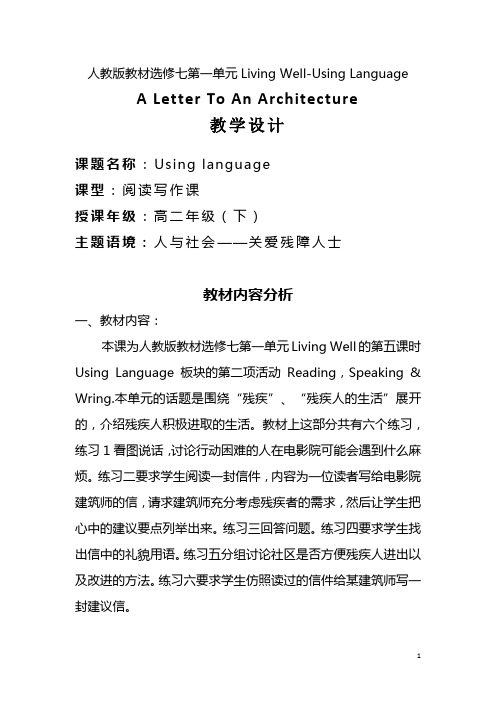
人教版教材选修七第一单元Living Well-Using LanguageA Letter To An Architecture教学设计课题名称:Using language课型:阅读写作课授课年级:高二年级(下)主题语境:人与社会——关爱残障人士教材内容分析一、教材内容:本课为人教版教材选修七第一单元Living Well的第五课时Using Language 板块的第二项活动Reading,Speaking & Wring.本单元的话题是围绕“残疾”、“残疾人的生活”展开的,介绍残疾人积极进取的生活。
教材上这部分共有六个练习,练习1看图说话,讨论行动困难的人在电影院可能会遇到什么麻烦。
练习二要求学生阅读一封信件,内容为一位读者写给电影院建筑师的信,请求建筑师充分考虑残疾者的需求,然后让学生把心中的建议要点列举出来。
练习三回答问题。
练习四要求学生找出信中的礼貌用语。
练习五分组讨论社区是否方便残疾人进出以及改进的方法。
练习六要求学生仿照读过的信件给某建筑师写一封建议信。
二、阅读文本分析:WhatReading部分呈现的是一封较为正式的写给一位电影院建筑师就新影院的设计的建议信,内容主要包括:1. 写信目的——考虑残障人士的需求;.2. 包括电梯设计(Adequate access for wheelchairs),耳机配置(Earphones for people who have trouble hearing),座位高度(Raised seating),厕所位置(Toilets)以及停车场位置(Car parking)等五个方面的建议;3. 表示感谢和期待,并表明合理设计的原因——利于残障人士也利于电影院的双赢局面。
How1. 结构上。
Reading在结构上采取了总分总的布局,先说明写信目的,随后从一些细节上体现对残障人士可能遭遇的问题的考虑而提出可行性建议,最后总结表示希望建议得到认可并进一步提出双赢的预期效益。
人教高中英语选修七:Unit1Living+well+(teachers)教案.doc

Unit 1 Living wellⅠWarming up1. Game playing: Take out a piece of paper and a pen, then draw a face on the paper with your eyes close.How did you feel when you were doing so?2. Do you think people with a disability can live well?Can you name some famous disabled people?What can you learn from them?Conclusion: They’re broken in body but firm in spirit. (身残志坚)3. Do they face more challenges in life?Would you like to read some stories about them?ⅡPre-reading: get close to “family village”Q: What is the website about?A: It tells stories of the disabled.ⅢReading: MARTY’S STORYⅰFast reading for general ideas.1.Marty is ___________ person.A. a healthyB. an illC. a disabledD. a rich2. Marty has __________ disease.A. a mentalB. a muscleC. an eyeD. a leg3. What’s Marty’s dream?A. Playing professional football and possibly representing his country in the World Cup.B. Being a doctor.C. Being a college student.D. Being a basketball player.4. Which of the following is TRUE?A. The doctor could give Marty’s disease a name.B. The doctor knew how to make Marty well.C. Someone in the world could cure the disease.D.No one could give Marty’s disease a name.5. Which of the following is false?A. Although there are a few students who look down upon him, Marty never gets annoyed.B. Marty leads a meaningful life and does not feel sorry for being disabled.C. Marty only spends time with his pets and never with his friends.D. Marty disability has made him more independent.Medical Record of MartyName: MartyGender: maleDisease: an unknown muscle diseaseSymptoms: clumsy and drop things or bump into furnitureⅱSecond reading: Match the main idea of each paragraph.Para.1: How his life has become easierPara.2: The advantages of his diseasePara.3: An introduction to Marty and his muscle disease.Para.4: How his disability developedPara.5: Marty met a lot of difficulties at school.ⅲThird reading1. In what does Marty tell his story? ( He tells his story in order of time.)before 10: What kind of life does he lead? How did he feel at that time?after 10 : What happened to him? What about his feeling? What was his problem when he was in primary school?at high school: How did he describe his life at high school?now: How is his life like? What about his feeling?2. How did his feeling change?Conclusion: the change of Marty’s feeling:happy3. What kind of person do you think Marty is?From his motto: Live one day at a time, we can see that Marty is an /a optimistic, brave, stupid, pessimistic, independent, strong-minded…person.4. Why has his fellow students’ conduct change d towards Marty?A. Because they are now high school students.B. Because they are all disabled people.C. Because Marty is now a healthy boy like them.D. Because they found that Marty was able to live as rich and full a life as everyone else.ⅳ SummaryMarty Fielding has a muscle disease that sometimes makes him very weak and he can’t run or climb stairs as quickly as other people. The doctors don’t know how to make him better. Fortunately, Marty has learned to adapt to his disability. He used to dream about one day playing professional football and representing (represent) his country in the World Cup. He doesn’t look any different from other people. So sometimes kids laugh at him when he gets out of breath. Life is much easier (easy) at high school than it was at primary school. Even when he is made fun of, he does not get annoyed. (annoy) Disabled as he is, Marty has become stronger and more independent. He suggests that we normal people should give the disabled more encouragement rather than laugh at them.精美句子1、善思则能“从无字句处读书”。
人教课标英语选修7 Unit 1 Living well Grammar 课件(共57张PPT)
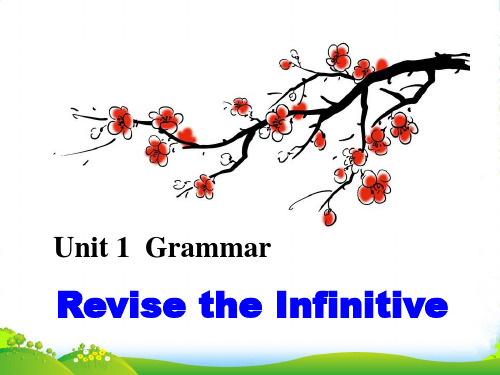
二、不定式作表语 (predicative)
• My job is to protect the world. • Your task is to _____________.
不定式常用在系动词 be, seem, appear, get, remain等后作表语。
Seeing is believing. To see is to believe.
10. He hopes _t_o_b_e_c_o_m__e (become) a teacher.
11. His ambition is _t_o_b__ec_o_m__e(become) an actor.
以上我们已经通过归纳总结和练习 对本课的语法内容有了一定的了解, 下面就让我们根据之前练习的考察 情况进一步选择讲解该语法项的重 难点。
1. Two years ago she bought an expensive mountain bike and then she persuaded me _t_o__b_u_y_ (buy) one.
2. Anyhow, my goal is _t_o_p__ro_v_i_d_e_ (provide) humans with a life of high quality.
Underline all the sentences in Reading which contain infinitives. Then mark their usages according to the headings below.
1 As the subject (S) 2 As the predicative (P) 3 As the object (O) 4 As the object complement (Oc) 5 As the attributive (A) 6 As the adverbial (Ad)
人教版高中英语选修7《Unit 1 Living well》教案2篇
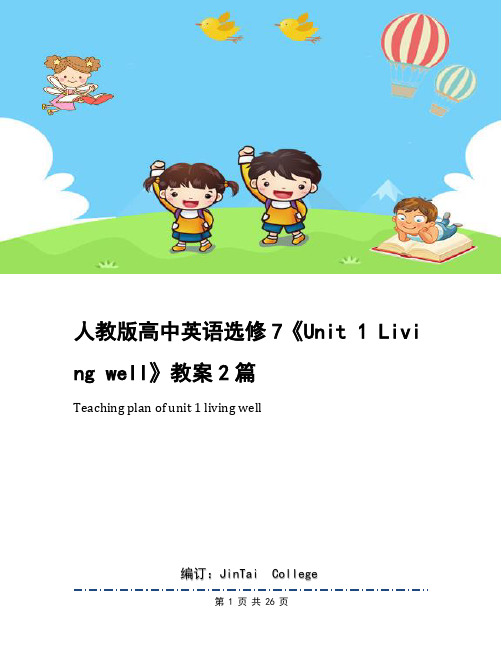
人教版高中英语选修7《Unit 1 Livi ng well》教案2篇Teaching plan of unit 1 living well编订:JinTai College人教版高中英语选修7《Unit 1 Living well》教案2篇前言:英语作为在许多国际组织或者会议上都是必需语言,几乎所有学校选择英语作为其主要或唯一的外语必修课。
英语教学涉及多种专业理论知识,包括语言学、第二语言习得、词汇学、句法学、文体学、语料库理论、认知心理学等内容。
本教案根据英语课程标准的要求和教学对象的特点,将教学诸要素有序安排,确定合适的教学方案的设想和计划、并以启迪发展学生智力为根本目的。
便于学习和使用,本文档下载后内容可按需编辑修改及打印。
本文简要目录如下:【下载该文档后使用Word打开,按住键盘Ctrl键且鼠标单击目录内容即可跳转到对应篇章】1、篇章1:人教版高中英语选修7《Unit 1 Living well》教案2、篇章2:人教版高中英语选修7《Unit 1 Living well》教案篇章1:人教版高中英语选修7《Unit 1 Living well》教案教学准备教学目标教学目标(这部分谢3点,按照USE的目标写)(1)学习建议信的结构、语言。
(2)讨论学校建筑物设计中行走不便的学生的需求。
(3)给校长写一封建议信。
(4)继续培养对残疾人的尊重和关爱意识。
教学重难点教学目标(这部分谢3点,按照USE的目标写)(1)学习建议信的结构、语言。
(2)讨论学校建筑物设计中行走不便的学生的需求。
(3)给校长写一封建议信。
(4)继续培养对残疾人的尊重和关爱意识。
教学过程Step 1Warming-up and lead-in (5 mins)(1)导入用本单元的阅读文Marty’s story来导入,引出残疾人的话题。
T: Hello, class. Inthe last lesson, we learnt Marty’s story. What’s the problem with Marty?(He has a raremuscle disease.)Yes, he’sdisabled.But is Martyleading a miserable life due to his disability?(No.)He is leading afulfilling life due to his own efforts. The disabled can live as good andcomfortable a life as we do. But it calls for more efforts.(2)揭题教师通过展示我们学校的图片以及通过采访班上一位曾经有行走困难的学生,点出学校有些地方可能对行走困难学生带来不便。
高中英语《Unit1 Livingwell》语法探究 新人教版选修7

Unit 1 Living well语法探究动词不定式复习中应注意的几个问题(1)不定式作表语与“be + to do sth.”的异同。
不定式作表语说明主语的内容或性质。
His job is to guard.(说明内容)be + to do sth.(表示按计划要做的事)(2)带不定式作宾语的词语。
下列词语常不定式作宾语:afford、promise、refuse、expect、hope、learn、offer、wish、want、fail、plan、agree、forget、like、prefer、decide、manage、try、arrange、determine、desire等。
下列动词后可接疑问词+不定式:teach、decide、wonder、show、learn、forget、ask、find、out、advise、discuss等。
(3)如何理解和使用不定式作宾补。
①动词see、watch、notice、hear、listen to、observe、feel、ta ste、smell、make、let、have等的宾补用动词原形,变被动时要加to,此时的不定式就是主语补足语。
②常用带不定式作宾补的几种情况:主语 + ask / require / tell / order / force / get / want / like + sb.to do sth.③主语 + think / judge / suppose / believe / consider /imagine/consider / feel + sb. + to be/ to have done④主语 + call on / upon / depend on / wait for / ask for + sb.+ to do sth.(4)不定式作定语的特殊用法。
①下列词语后常接不定式作定语:chance、wish、right、courage、need、promise、time、opportunity、way、the first、the second、the last、the only等。
人教版高中英语选修7unit1 Living_well

汇报人:XX
目录
01 单 击 添 加 目 录 项 标 题 02 单 元 概 述 03 听 力 与 口 语 训 练 04 阅 读 理 解 05 词 汇 与 语 法 学 习 06 写 作 训 练
01
添加章节标题
02
单元概述
单元主题介绍
单元主题:Living well 主要内容:健康生活方式、心理健康、人际关系、生活技能等 学习目标:提高学生的健康意识和生活技能,帮助他们更好地应对生活中的挑战
添加标题
解析:这些词汇都与健康生活方式有关,包括身体健康、心理健康、情感健康、社交健康、财 务健康和环境健康。
添加标题
例句: helthy lifestyle includes regulr exercise, blnced diet, nd enough sleep.
添加标题
语法:在介绍这些词汇时,可以结合语法知识,如形容词、名词、动词等,帮助学生更好地理 解和掌握词汇的用法。
添加标题
添加标题
添加标题
添加标题
残疾人教育:西方国家重视残疾 人教育,提供特殊教育服务和支 持,帮助残疾人接受教育。
残疾人生活设施:西方国家注重 残疾人生活设施的建设,提供无 障碍设施,方便残疾人出行和生 活。
中西方残疾人生活状况对比
中国残疾人生活状况:政府重视,政策支持,社会关爱 西方残疾人生活状况:注重个人权利,倡导平等参与,社会环境友好 中西方残疾人教育对比:中国注重特殊教育,西方注重融合教育 中西方残疾人就业对比:中国政府提供就业扶持,西方企业注重多元化和包容性
写作范文解析
范文题目:《Living Well》
范文结构:引言、主体、 结论引言部分:引出主题, 提出观点
2018-2019学年高二英语新人教版选修7学案:Unit 1 Living well-语法篇(教师版)
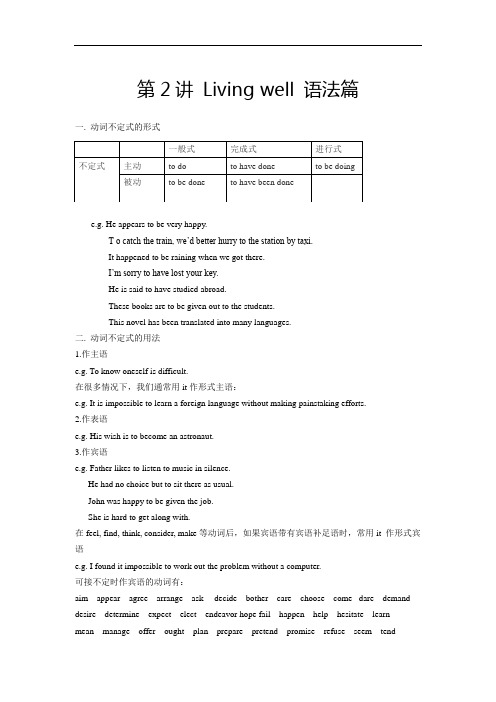
第2讲Living well 语法篇一. 动词不定式的形式e.g. He appears to be very happy.T o catch the train, we’d better hurry to the station by taxi.It happened to be raining when we got there.I’m sorry to have lost your key.He is said to have studied abroad.These books are to be given out to the students.This novel has been translated into many languages.二. 动词不定式的用法1.作主语e.g. To know oneself is difficult.在很多情况下,我们通常用it作形式主语:e.g. It is impossible to learn a foreign language without making painstaking efforts.2.作表语e.g. His wish is to become an astronaut.3.作宾语e.g. Father likes to listen to music in silence.He had no choice but to sit there as usual.John was happy to be given the job.She is hard to get along with.在feel, find, think, consider, make等动词后,如果宾语带有宾语补足语时,常用it 作形式宾语e.g. I found it impossible to work out the problem without a computer.可接不定时作宾语的动词有:aim appear agree arrange ask decide bother care choose come dare demand desire determine expect elect endeavor hope fail happen help hesitate learnmean manage offer ought plan prepare pretend promise refuse seem tendwait wish refuse attempt continue4.作宾语补足语e.g. I heard them sing yesterday.She asked me to answer the phone in her absence.注意:hope, demand, suggest后不能接不定式作宾语补足语。
高中英语Unit1 Living Well人教版选修七

Unit1 Living WellReading taskTeaching Aims1.Learn Zhang Yuncheng’ s story and his courage to overcome the difficulties andachieve his ambition.2.Develop the reading skills by writing comprehension questions.3.Learn the writing skills ―― an effective way of summarizing a text. Teaching Key Points and Difficult Points1. Enable to students to master the writing skills ――summarizing a text.2. Develop students’ability to cooperate by getting them involved in pair work andgroup work.Teaching Methods1. Individual, pair or group work and discussion.2. Student-focus approach and task-based approach.Teaching AidsA computer and a projector.Teaching ProceduresI Pre-readingThis step is to interest the students in Zhang Yuncheng and his story.1. Greetings.2.Show students some pictures and provide students with some background information. II Reading1. Discuss the following question. Let students know the text they are going to readis a newspaper article.Where do you think you might see a text like Zhang Yuncheng Achieves His Ambition? Tick the correct answer.A. In a diary.B. In a newspaper.C. In an encyclopedia (百科全书).Answer B2. Students read the text and underline the information they think is important.3. Students work in groups to write five comprehension questions based on the importantinformation.4. Students swap their questions with another group. Help each other with anydifficulties they have understanding the text.(Teacher may ask students to do Task 2 and Task 3 before class.)5. Check with the whole class what important points should be covered in the summaryand decide what information is important and what information is comparatively unimportant.√• What has Zhang Yuncheng achieved?√• What kind of disease does Zhang Yuncheng have?√• What are the problems caused by his disability?•Why didn’t his parents send him back to school?√• What does Zhang Yuncheng do in spite of his disability?√• How did Zhang Yuncheng achieve his ambition?•What is Zhang Yuncheng’ s book about?6. Students write the important facts in note form. Help Zhang Yuncheng to completehis resume. While checking the notes, ask students to answer the following questions • What has Zhang Yuncheng achieved?• What kind of disease does Zhang Yuncheng have?• What does Zhang Yuncheng do in spite of his disability?How did Zhang Yuncheng achieve his ambition?AnswerResume履历表First Name名姓Sex 性别 Male √ FemaleHealth 健康状况Education 教育背景Interests and hobbies 兴趣爱好Personal experiences and achievements 个人经历和成绩Taught himself to read and writeWrote a letter to a newspaper about his life and dreamsKept writing and sent essays to an editorWrote and published a bookIII Summary Writing —summarize the text and write a short article of about 150 words to introduce Zhang Yuncheng.Help students to write the article based on the notes.1. Write the introduction of the text. Students work in pairs and write the openingsentence (a topic sentence that sum up briefly the main idea of the text). They should say something about what Zhang Yuncheng has achieved.Topic sentence 1Although Zhang Yuncheng has a disability which prevents him from moving without pain, he succeeded in publishing a book at the age of 25.Topic sentence 2That Zhang Yuncheng overcame all the difficulties to achieve his ambition to publisha book inspires all the readers.2. Write the middle (the body) of the text.(1) Explain to students the following points• The summary should be in your own words.• Writing a summary, remember to— cover all the important points.— Leave out the details.— Reduce the examples.— Simplify the descriptions.— Change clauses or sentences to phrases.— Put the main points of a dialogue in indirect speech.(2) Tell students that they should start a new paragraph for each new topic andthat the middle may consist of two paragraphs. Ask students what the main idea of each paragraph may be.Possible answerThe middle may consist of _two_ paragraphs.The first paragraph is about _his disability and problems caused by his disability.The second paragraph is about _what he does in spite of his disability and how he achieved his ambition.(3) Show students the sample writing. Ask students if they enjoy the writing andhow they can improve the writing.Zhang Yuncheng has a m uscle disease and very weak. He can not walk. He can’t get out of bed without help and he can not lift his arms above his head. He went to school for only one day.(4) Students work with their partner to write the first paragraph. Help studentsto use connectives and transitional phrases (过渡连接词) so that one sentence runs smoothly to another.Possible answerZhang Yuncheng has a muscle disease that makes him very weak. Because of his illness, he is unable to walk or even get out of bed without help. Also, he can hardly lift his arms above his head. Different from others, he went to school for only one day.(5) Help students to use a transitional sentence (过渡句) so that the first paragraphleads naturally to the second paragraph.Possible answer• No matter how challenging life can be, Zhang Yuncheng still manages to enjoy it. • In spite of all these difficulties, Zhang Yuncheng never gives up himself.(6) Prepare the students for the second paragraph. Ask students to use transitions.Remind students to simplify the description of how Zhang Yuncheng achieved his ambition.Phrases students might useLike many other people, …At the same time, …With the help of Zhang Danuo, …What’s more/Besides, …Finally, …Sample answerIn spite of all these difficulties, he never gives up himself. Like many other people, Zhang Yuncheng enjoys reading and writing. He has ambitions at the same time.He taught himself to read and write. At the age of 17, he wrote to a newspaper about his life and dreams. With the help of Zhang Danuo, an editor, Zhang Yuncheng kept writing and finally achieved his lifelong ambition to publish a book.3. Write a conclusion for the text. Help students to summarize what Zhang Yunchengsays in indirect speech.Sample answerZhang Yuncheng says that he enjoys his life and is determined to do as much as he can. IV Consolidation1. Review how to summarize the text and write an article about Zhang Yuncheng.2. Teach students how to edit the first draft.Compare your first draft carefully with the original. Read it several times and look for ways to improve it. Ask questions like• Have I included all the important points?• Are sentences about the same topic in the same paragraph?• Have I started a new paragraph for each new topic?• Are any of the sentences or words unnecessary?• Is the grammar and spelling correct?V Homework1. Write a clean, final draft of the summary.2. Swap your article with your partner and ask your partner if she/he can suggest ways to improve your writing.。
新人教版高二英语选修七第一单元livingwell教案之语言点详解

新人教版高二英语选修七第一单元Living well教学设计之语言点详解词汇详解:一词语辨析1). all in all/ in all/ at all/ after all/ above all/ first of all【解说】all in all 总而言之in all 总合at all 根本after all 毕竟;别忘了(放句首时)above all 最重要 , 第一first of all 第一【练习】选择 all in all/ in all/ at all/ after all/ above all或first of all并用其适合的形式填空1)Don ’tblame him too much. ________, he is a small child.2)According to the survey, _______ there are nearly one million people in this small city outof work during the economic crisis.3)I am glad to join you in this game, but ________ please allow me to introduce myself to you.4)The parents didn ’tworry about their daughter _______, for they believed she could succeedin getting the first prize.5)When traveling abroad, _______, you need to prepare your passport.6)There are many beautiful sentences in your article and its handwriting is good too. ________, I’m quite satisfied with it.Keys: 1) After all 2) in all 3) first of all 4) at all 5) above all 6) All in all二词性变化1. disability n. 无能;残疾disabled adj. 伤残的able adj.能干的;能够的2. ambition n. 野心,壮心ambitious adj. 有壮心的,雄心勃勃的3.beneficial adj. 有利的benefit v.&n. 得益;利益,利处4. independent adj.独立的independence n.独立depend v.依靠,依靠5.encouragement n.鼓舞encourage v.鼓舞courage n.勇气,精神【练习】依据句子构造,用括号内所提口供的适合形式填空1)The ______ girl swims well in spite of her _______.(disable)2)Robert is a very _______ man and one of his ______ is to travel in Antarctica. (ambition)3)If you want to be a _______, you should work hard at ______ and care for ______ situations. (politics)4)It is known to all that fresh air is _______ to our health and the new park ______ us all, so we should keep it clean.(benefit)5)The boy who used to ______on his parents now wants the ______ from them and is learning to be _______.(depend)6)Praise acts as an ______ to the players, and therefore they will feel ______ and get the_______to continue and improve their performance.(encourage)7)My brother ______ from a well-known American university. My parents attended his _______ ceremony yesterday.(graduate)8)When someone ______ others on their success, he or she usually says ―_______‖ .(congratulate)9) This concert was _______ by a famous _______ from Vienna. (conduct)keys:1) disabled; disabilities 2) ambitious; ambitions 3) politician; politics; political 4) beneficial; benefits 5) depend; independence; independent 6) encouragement; encouraged; courage 7) graduated; graduation 8) congratulates; congratulations 9) conducted; conductor三要点词汇1. ambition(n.) 壮心[ 要点用法 ]ambitious adj.理想远大的;有壮心壮志的;有野心的be ambitious for [power, social position, etc.] 极欲获取 [ 权利 , 社会地位等 ] beambitious of success 盼望成功be ambitious to serve the people 一心想为人民服务[ 典例 ]1) Her ambition is the presidency.她的抱是成一名2) After several hours ’work, she had no ambition to go dancing.没有精力去跳舞了3) The prince was attracted by the girl ’s beauty, and ambitious to marry her.王子女孩的美貌打了,盼望能娶到她。
选修7 Unit 1 Living well grammar 语法不定式
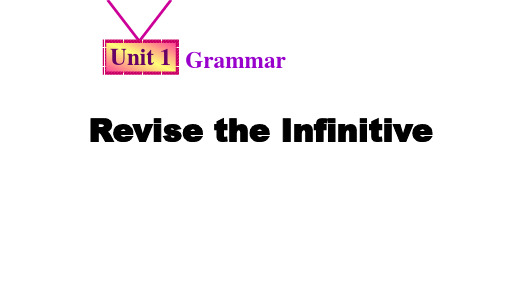
• 10.I have one or two things _to__s_e_e_to__(see to). • 11.She did nothing but _t_a_k_e____(take) walk in the street. • 12.It is a problem that doesn’t need __to__b_e_s_o_lv_e_d______( solve)
is so good t_o_b_r_e_a_th_e___( breathe).
2. I feel greatly honored__t_o_b_e__w_e_lc_o_m__e_d_ ( welcome) into their society 3.The meeting _to__t_a_ke__p_la_c_e____(take place) next week is sure to be a great success.
2. 作表语:说明主语的具体内容,其主语常是: wish, idea, task, purpose, duty, job, dream等名词,
• His job is to protect the world.
• Your task is _____________(learn) English .
意义
一般时
to do
to be done
表示动作与谓语动作同时 发生或发生在谓语动作之
后
完成时 to have done to have 表示动作发生在谓语动作
been done
之前
进行时 to be doing
表示谓语动作发生时,不定 -
式的动作正在进行
(1) They pretended not toቤተ መጻሕፍቲ ባይዱsee us. (一般式表示与谓语的动作同时/几乎/发 生在它之后。)
- 1、下载文档前请自行甄别文档内容的完整性,平台不提供额外的编辑、内容补充、找答案等附加服务。
- 2、"仅部分预览"的文档,不可在线预览部分如存在完整性等问题,可反馈申请退款(可完整预览的文档不适用该条件!)。
- 3、如文档侵犯您的权益,请联系客服反馈,我们会尽快为您处理(人工客服工作时间:9:00-18:30)。
第2讲Living well 语法篇____________________________________________________________________________________________________________________________________________________________________1.熟练掌握动词不定式的形势与用法;2.能够熟练运用动词不定式各种形式。
一. 动词不定式的形式e.g. He Array appears to be veryhappy.T o catchthe train,we’dbetter hurry to the station by taxi.It happened to be raining when we got there.I’m sorry to have lost your key.He is said to have studied abroad.These books are to be given out to the students.This novel has been translated into many languages.二. 动词不定式的用法1.作主语e.g. To know oneself is difficult.在很多情况下,我们通常用it作形式主语:e.g. It is impossible to learn a foreign language without making painstaking efforts.2.作表语e.g. His wish is to become an astronaut.3.作宾语e.g. Father likes to listen to music in silence.He had no choice but to sit there as usual.John was happy to be given the job.She is hard to get along with.在feel,find,think,consider,make等动词后,如果宾语带有宾语补足语时,常用it 作形式宾语e.g. I found it impossible to work out the problem without a computer.可接不定时作宾语的动词有:aim appear agree arrange ask decide bother care choose come dare demand desiredetermine expect elect endeavor hope fail happen help hesitate learn mean manageoffer ought plan prepare pretend promise refuse seem tend wait wish refuse attempt continue4.作宾语补足语e.g. I heard them sing yesterday.She asked me to answer the phone in her absence.注意:hope,demand,suggest后不能接不定式作宾语补足语。
5.作定语e.g. The next train to arrive was from New York.On Sundays,he always has a lot of letters to write.6.作状语e.g. I’m saving up to buy a computer.He got to the station only to find the train had gone.不定式表示结果常见于下列句型。
1) so ... as to do Would you be so kind as to lend me your bicycle 把你的自行车借给我好吗?2) such ... as to do We are not such fools as to believe him. 我们还没蠢到竟会相信他。
3) enough… to do He didn't run fast enough to catch the train.他跑得不够快,没赶上火车。
4) only to do He lifted a rock only to drop it on his own feet. 他搬起石头砸自己的脚。
5) too ... to do His eyesight is too poor to read such small letters. 她的视力太差了,不能看这么小的字。
注意: too...to...结构中的形容词如果是eager,pleased,happy,ready等,动词不定式不表示结果,也没有否定的意思。
The boy was too eager to get a geography book. 那个男孩非常急切地想要得到一本地理书。
He is too anxious to know the examination results. 他很急切地想知道考试结果。
三. 不定式的几种常见结构1.不定式的复合结构e.g. This box is too heavy for the little boy to carry.2.疑问词+不定式结构e.g. I don’t know whether to go to the meeting or not.3.with/without+名词+不定式结构e.g. With so much work to do,I’m not able to go to the cinema.4.用作独立成分的不定式e.g. To be frank,I don’t agree with what you said.可做插入语的还有:to tell you the truth 说老实话to be frank 坦率地说to begin with 首先to make a long story short 长话短说to be exact 精确地说to say nothing of 姑且不说to be sure 诚然,固然to do him justice 说句对他公道的话so to speak 可以这么说5.用主动形式表示被动含义e.g. Do you have anything to say on this question?The book is difficult to understand.There is nothing to worry about.高中阶段常见带介词的to短语归纳:be/get/become used to 习惯于be given to 沉溺于be related to 与…有关系be addicted to 沉溺于;对…上瘾be opposed to 反对devote oneself to献身于;专心于get down to 着手做lead to 导致object to反对;不喜欢;不赞成put one’s mind to全神贯注于give rise to 引起look forward to 盼望pay attention to 注意stick to 坚持make contributions to对…作贡献1.(2019湖南卷)ourselves from the physical and mental tensions,we each need deep thoughtand inner quietness.A.Having freedB. FreedC. To freeD. Freeing答案: C解析: 不定式做目的状语是不定式的一个经典用法。
而且本句的主语we和动词free之间构成主动关系,可以使用不定式或者现在分词。
但是A项使用的是不定式的完成式,表示已经完成的动作,这不符合上下文语境。
句义:为了让我们免受精神和身体压力的伤害,我们每个人都需要深入的思考和内心的安宁。
2.(2019江西)He is thought ___foolishly .Now he has no one but himself to blame for losing the job.A. to actB.to have actedC.actingD. having acted答案: B解析: 本句考察的是固定句式:Sb be though to…某人被认为…;如果表示的是一个已经完成的动作,就使用不定式的完成式,如果是正在进行的动作,就使用不定式的进行式。
句义:他被认为表现很糟糕,现在他只能责怪自己丢了那份工作。
根据句义可知他表现很糟糕是在丢掉工作之前,所以使用不定式的完成式。
故B正确。
3.(2019陕西卷)20. ________ the difficult maths problem,I have consulted Professor Russell several times.A. Working outB. Worked outC. To work outD. Work out答案: C解析: 本题考察的是不定式做目的状语的用法,在非谓语动词中通常只有不定式才可以表示目的状语。
句义:为了算出这个数学问题,我已经咨询了拉塞尔教授好几次了。
ABD三项都不能表示目的状语。
故C正确。
4.(2019四川卷)7. — I hope to take the computer course.— Good idea. ____ more about it,visit this website.A. To find outB. Finding outC. To be finding outD. Having found out答案: A解析: 考查非谓语动词中的不定式用法。
动词不定式可以放在句首作目的状语,译为“为了…”。
句意:——我想参加这个电脑课程。
——好主意。
要想得到更多有关的信息,请登陆这个网站。
Visit this website是一个祈使句,表示建议。
故A正确。
5.(2019天津卷)5. Anxiously,she took the dress out of the package and tried it on,only _________ it didn’t fitA. to findB. foundC. findingD. having found答案: A解析: 本题考察的是不定式做结果状语用法,在非谓语动词中,不定式常常和only连用,表示意料之外的结果。
